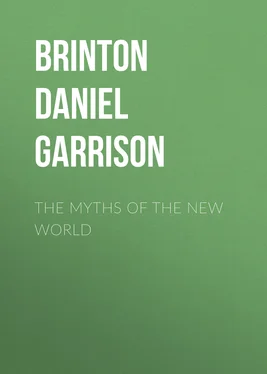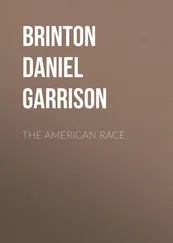Daniel Brinton - The Myths of the New World
Здесь есть возможность читать онлайн «Daniel Brinton - The Myths of the New World» — ознакомительный отрывок электронной книги совершенно бесплатно, а после прочтения отрывка купить полную версию. В некоторых случаях можно слушать аудио, скачать через торрент в формате fb2 и присутствует краткое содержание. Жанр: foreign_prose, История, Старинная литература, Мифы. Легенды. Эпос, foreign_edu, foreign_antique, на английском языке. Описание произведения, (предисловие) а так же отзывы посетителей доступны на портале библиотеки ЛибКат.
- Название:The Myths of the New World
- Автор:
- Жанр:
- Год:неизвестен
- ISBN:нет данных
- Рейтинг книги:5 / 5. Голосов: 1
-
Избранное:Добавить в избранное
- Отзывы:
-
Ваша оценка:
- 100
- 1
- 2
- 3
- 4
- 5
The Myths of the New World: краткое содержание, описание и аннотация
Предлагаем к чтению аннотацию, описание, краткое содержание или предисловие (зависит от того, что написал сам автор книги «The Myths of the New World»). Если вы не нашли необходимую информацию о книге — напишите в комментариях, мы постараемся отыскать её.
The Myths of the New World — читать онлайн ознакомительный отрывок
Ниже представлен текст книги, разбитый по страницам. Система сохранения места последней прочитанной страницы, позволяет с удобством читать онлайн бесплатно книгу «The Myths of the New World», без необходимости каждый раз заново искать на чём Вы остановились. Поставьте закладку, и сможете в любой момент перейти на страницу, на которой закончили чтение.
Интервал:
Закладка:
36
“As the high heavens, the far-off mountains look to us blue, so a blue superficies seems to recede from us. As we would fain pursue an attractive object that flees from us, so we like to gaze at the blue, not that it urges itself upon us, but that it draws us after it.” Goethe, Farbenlehre , secs. 780, 781.
37
Loskiel, Geschichte der Mission der Evang. Brueder , p. 63: Barby, 1789.
38
Cogolludo, Historia de Yucathan , lib. iv. cap. vii.
39
Rel. de la Nouv. France. An 1636, p. 107.
40
This word is found in Gallatin’s vocabularies ( Transactions of the Am. Antiq. Soc. , vol. ii.), and may have partially induced that distinguished ethnologist to ascribe, as he does in more than one place, whatever notions the eastern tribes had of a Supreme Being to the teachings of the Quakers.
41
Bruyas, Radices Verborum Iroquæorum , p. 84. This work is in Shea’s Library of American Linguistics, and is a most valuable contribution to philology. The same etymology is given by Lafitau, Mœurs des Sauvages , etc., Germ. trans., p. 65.
42
My authorities are Riggs, Dict. of the Dakota , Boscana, Account of New California , Richardson’s and Egede’s Eskimo Vocabularies, Pandosy, Gram. and Dict. of the Yakama (Shea’s Lib. of Am. Linguistics), and the Abbé Brasseur for the Aztec.
43
These terms are found in Gallatin’s vocabularies. The last mentioned is not, as Adair thought, derived from issto ulla or ishto hoollo , great man, for in Choctaw the adjective cannot precede the noun it qualifies. Its true sense is visible in the analogous Creek words ishtali , the storm wind, and hustolah , the windy season.
44
Webster derives hurricane from the Latin furio . But Oviedo tells us in his description of Hispaniola that “Hurakan, in lingua di questa isola vuole dire propriamente fortuna tempestuosa molto eccessiva, perche en effetto non è altro que un grandissimo vento è pioggia insieme.” Historia dell’ Indie , lib. vi. cap. iii. It is a coincidence—perhaps something more—that in the Quichua language huracan , third person singular present indicative of the verbal noun huraca , means “a stream of water falls perpendicularly.” (Markham, Quichua Dictionary , p. 132.)
45
Oviedo, Rel. de la Prov. de Cueba , p. 141, ed. Ternaux-Compans.
46
Garcia, Origen de los Indios , lib. iv. cap. xxii.
47
See the Rel. de la Nouv. France pour l’An 1637 , p. 49.
48
Mr. Morgan, in his excellent work, The League of the Iroquois , has been led astray by an ignorance of the etymology of these terms. For Schoolcraft’s views see his Oneota , p. 147. The matter is ably discussed in the Etudes Philologiques sur Quelques Langues Sauvages de l’Amérique , p. 14: Montreal, 1866; but comp. Shea, Dict. Français-Onontagué , preface.
49
“Qui ne prend aucun soin des choses icy bas.” Jour. Hist. d’un Voyage de l’Amérique , p. 225: Paris, 1713.
50
In attributing this speech to the Inca Yupanqui, I have followed Balboa, who expressly says this was the general opinion of the Indians ( Hist. du Pérou , p. 62, ed. Ternaux-Compans). Others assign it to other Incas. See Garcilasso de la Vega, Hist. des Incas , lib. viii. chap. 8, and Acosta, Nat. and Morall Hist. of the New World , chap. 5. The fact and the approximate time are beyond question.
51
Xeres, Rel. de la Conq. du Pérou , p. 151, ed. Ternaux-Compans.
52
Prescott, Conq. of Mexico , i. pp. 192, 193, on the authority of Ixtlilxochitl.
53
Brasseur, Hist. du Mexique , iii. p. 297, note.
54
Of very many authorities that I have at hand, I shall only mention Heckewelder, Acc. of the Inds. p. 422, Duponceau, Mém. sur les Langues de l’Amér. du Nord , p. 310, Peter Martyr De Rebus Oceanicis , Dec. i., cap. 9, Molina, Hist. of Chili , ii. p. 75, Ximenes, Origen de los Indios de Guatemala , pp. 4, 5, Ixtlilxochitl, Rel. des Conq. du Mexique , p. 2. These terms bear the severest scrutiny. The Aztec appellation of the Supreme Being Tloque nahuaque is compounded of tloc , together, with, and nahuac , at, by, with, with possessive forms added, giving the signification, Lord of all existence and coexistence (alles Mitseyns und alles Beiseyns, bei welchem das Seyn aller Dinge ist. Buschmann, Ueber die Aztekischen Ortsnamen , p. 642). The Algonkin term Kittanittowit is derived from kitta , great, manito , spirit, wit , an adjective termination indicating a mode of existence, and means the Great Living Spirit (Duponceau, u. s.). Both these terms are undoubtedly of native origin. In the Quiche legends the Supreme Being is called Bitol , the substantive form of bit , to make pottery, to form, and Tzakol , substantive form of tzak , to build, the Creator, the Constructor. The Arowacks of Guyana applied the term Aluberi to their highest conception of a first cause, from the verbal form alin , he who makes (Martius, Ethnographie und Sprachenkunde Amerika’s , i. p. 696).
55
Geschichte der Amerikanischen Urreligionen , p. 403.
56
Bruyas, Rad. Verb. Iroquæorum , p. 38.
57
Alcazar, Chrono-historia de la Prov. de Toledo , Dec. iii., Año viii., cap. iv: Madrid, 1710. This rare work contains the only faithful copies of Father Rogel’s letters extant. Mr. Shea, in his History of Catholic Missions, calls him erroneously Roger.
58
It is fully analyzed by Duponceau, Langues de l’Amérique du Nord , p. 309.
59
Discourse on the Religion of the Ind. Tribes of N. Am. , p. 252 in the Trans. N. Y. Hist. Soc.
60
Mueller, Amer. Urreligionen , pp. 265, 272, 274. Well may he remark: “The dualism is not very striking among these tribes;” as a few pages previous he says of the Caribs, “The dualism of gods is anything but rigidly observed. The good gods do more evil than good. Fear is the ruling religious sentiment.” To such a lame conclusion do these venerable prepossessions lead. “ Grau ist alle Theorie .”
61
Loskiel, Ges. der Miss. der evang. Brueder , p. 46.
62
Whipple, Report on the Ind. Tribes , p. 33: Washington, 1855. Pacific Railroad Docs.
63
Schoolcraft, Indian Tribes , i. p. 359.
64
In Schoolcraft, Ibid. , iv. p. 642.
65
Or more exactly, the Beautiful Spirit, the Ugly Spirit. In Onondaga the radicals are onigonra , spirit, hio beautiful, ahetken ugly. Dictionnaire Français-Onontagué, édité par Jean-Marie Shea : New York, 1859.
Читать дальшеИнтервал:
Закладка:
Похожие книги на «The Myths of the New World»
Представляем Вашему вниманию похожие книги на «The Myths of the New World» списком для выбора. Мы отобрали схожую по названию и смыслу литературу в надежде предоставить читателям больше вариантов отыскать новые, интересные, ещё непрочитанные произведения.
Обсуждение, отзывы о книге «The Myths of the New World» и просто собственные мнения читателей. Оставьте ваши комментарии, напишите, что Вы думаете о произведении, его смысле или главных героях. Укажите что конкретно понравилось, а что нет, и почему Вы так считаете.












